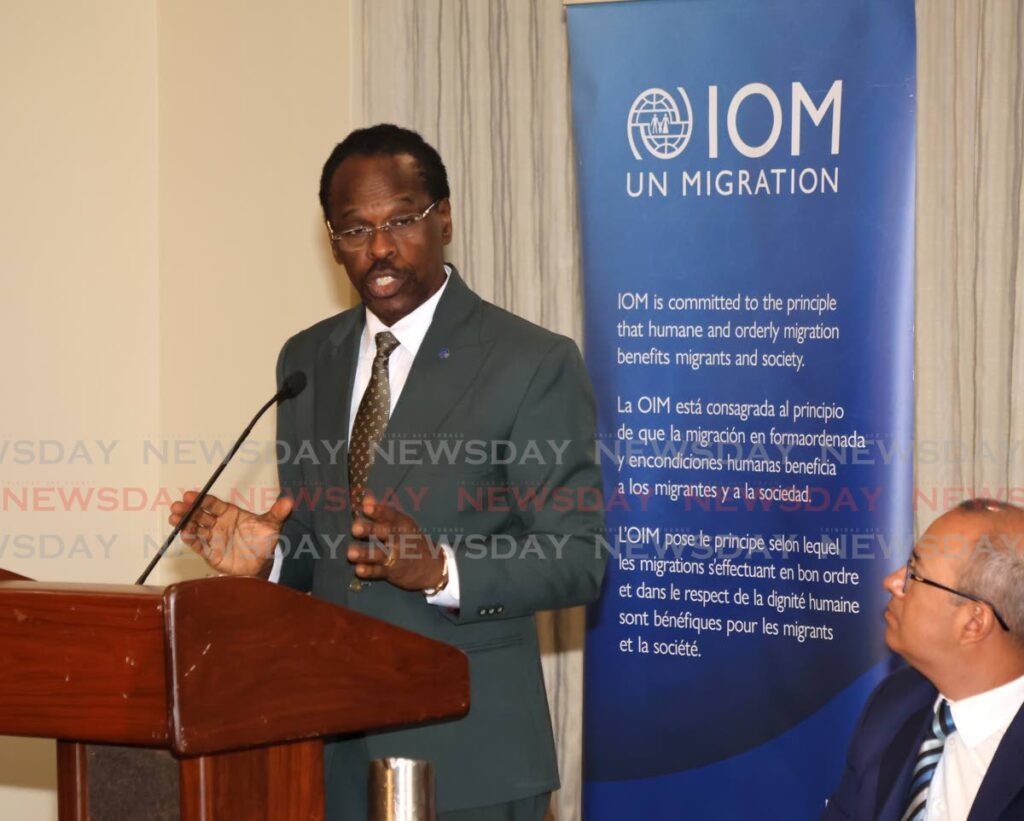Hinds: Too much bacchanal in Trinidad and Tobago

National Security Minister Fitzgerald Hinds said Trinidad and Tobago is afflicted by three challenges: a lack of productivity, an overwhelming presence of corruption and bacchanal.
"This undermines the very lofty things we plan and think about."
Speaking at the opening ceremony of the Organisation of Eastern Caribbean States (OECS) regional two-day workshop at the Hilton Trinidad and Conference Centre in St Ann's on May 8, Hinds called the workshop critical to the region.
"This workshop on disaster displacement, disaster risk reduction and human security is needed, so we can find measures for heightened preparedness, especially during the upcoming wet and hurricane seasons."
He expressed his encouragement by a speaker before him, Dr Natasha Mortley, OECS strategy adviser. He said Mortley had valuable experience and community insight and the evidence of real people on the ground in communities taking collective action.
Hinds said it was an opportunity to pursue collectively programmed cross-border migrant evacuation measures to ensure the safety and well-being of all people during times of crisis.
He stressed the particular relevance of these measures in the "complex multi-hazard environment" in which small island developing states exist and are exposed to disproportionate threats and shocks.
"When disasters take place, experts say the devastation can be up to six times greater than in developed countries."
Hinds said the government is hoping to find solutions as climate-related hazards increase.
"Concepts such as disaster risks, displacement and human insecurity are not merely theoretical concepts but living realities that deeply impact our region."
Hinds lamented Hurricane Irma, its devastation and the displacement it caused in 2017.
"The then-Prime Minister Patrick Manning encouraged TT citizens to open our doors to our brothers and sisters in Dominica; that is a living experience of displacement and how real it can get."
He said in recent years, the region has experienced profound social, economic, environmental and cultural impacts caused by various hazards, including the volcanic eruption in St Vincent and the Grenadines, which occurred during the covid19 pandemic.
Hinds said due to these events, the Caribbean had to identify measures of internal and cross-border displacement for people.
"These recurring threats hinder our developmental efforts and impede our progress towards national and regional development."
He stressed that, as a region, these issues must be addressed with urgency, collectively and with resolve. He hopes the workshop will continue to integrate resources developed for managing human mobility issues within regional and national response mechanisms.
"This is significant for integrating human mobility across national policies and plans related to climate change adaptation, disaster risk reduction and development."
Hinds emphasised TT's proactive approach to addressing challenges, particularly cross-border migration and disaster preparedness. He highlighted the development of a cross-border evacuation programme under the human-security umbrella, aiming to protect vulnerable populations during crises.
Hinds praised the country's efforts to support migrants and spoke about the registration framework for Venezuelan migrants and collaboration with international organisations for humanitarian assistance.
He ended with a call for a reaffirmation of commitment to building a resilient and secure future for the region.
Mortley discussed the progress made in addressing climate change and human-mobility challenges.
She said the ministerial declaration signed by member states at the second Immigration Council of Ministers meeting in Dominica last year and developed under the joint human security programme with support from international organisations reflects a collective commitment to combating climate change, which poses a severe threat to the Caribbean.
Despite facing challenges due to a lack of comprehensive empirical data, Mortley acknowledged the severe impacts of environmental and climate hazards on small island developing states, which she said leads to various forms of inter-island migration. Mortley said women, girls and other vulnerable groups, such as children, the elderly and indigenous communities, are disproportionately affected by displacement.
She praised the efforts of Caribbean communities, alongside work by organisations like the Intergovernmental Panel on Climate Change (IPCC) and the OECS.
Mortley stressed the importance of evidence-based research grounded in the lived experiences of marginalised communities for the implementation of effective policies and strategies.

Comments
"Hinds: Too much bacchanal in Trinidad and Tobago"